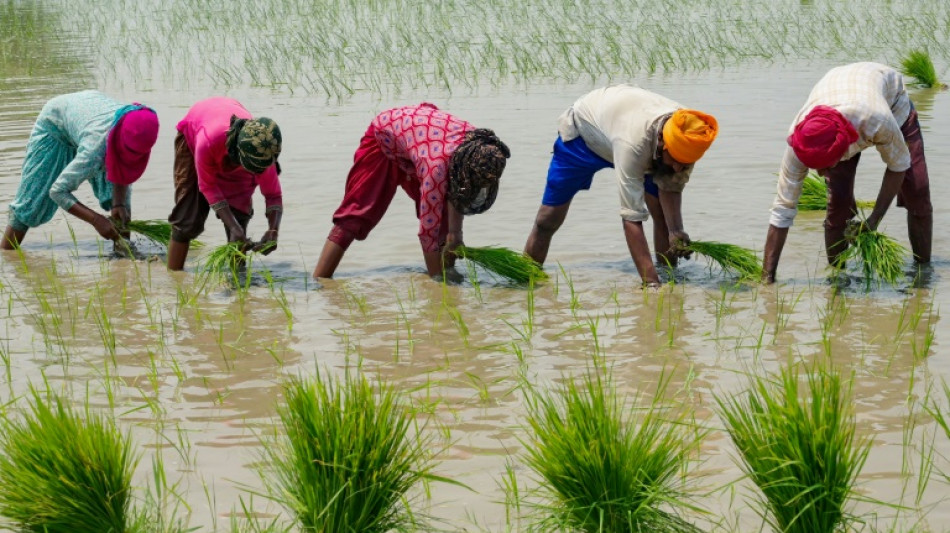
-
 Thailand's pilot PM lands runaway election win
Thailand's pilot PM lands runaway election win
-
Sarr strikes as Palace end winless run at Brighton

-
 Olympic star Ledecka says athletes ignored in debate over future of snowboard event
Olympic star Ledecka says athletes ignored in debate over future of snowboard event
-
Auger-Aliassime retains Montpellier Open crown

-
 Lindsey Vonn, skiing's iron lady whose Olympic dream ended in tears
Lindsey Vonn, skiing's iron lady whose Olympic dream ended in tears
-
Conservative Thai PM claims election victory

-
 Kamindu fireworks rescue Sri Lanka to 163-6 against Ireland
Kamindu fireworks rescue Sri Lanka to 163-6 against Ireland
-
UK PM's top aide quits in scandal over Mandelson links to Epstein

-
 Reed continues Gulf romp with victory in Qatar
Reed continues Gulf romp with victory in Qatar
-
Conservative Thai PM heading for election victory: projections

-
 Heartache for Olympic downhill champion Johnson after Vonn's crash
Heartache for Olympic downhill champion Johnson after Vonn's crash
-
Takaichi on course for landslide win in Japan election

-
 Wales coach Tandy will avoid 'knee-jerk' reaction to crushing England loss
Wales coach Tandy will avoid 'knee-jerk' reaction to crushing England loss
-
Sanae Takaichi, Japan's triumphant first woman PM

-
 England avoid seismic shock by beating Nepal in last-ball thriller
England avoid seismic shock by beating Nepal in last-ball thriller
-
Karl defends Olympic men's parallel giant slalom crown

-
 Colour and caution as banned kite-flying festival returns to Pakistan
Colour and caution as banned kite-flying festival returns to Pakistan
-
England cling on to beat Nepal in last-ball thriller

-
 UK foreign office to review pay-off to Epstein-linked US envoy
UK foreign office to review pay-off to Epstein-linked US envoy
-
England's Arundell eager to learn from Springbok star Kolbe

-
 Czech snowboard great Ledecka fails in bid for third straight Olympic gold
Czech snowboard great Ledecka fails in bid for third straight Olympic gold
-
Expectation, then stunned silence as Vonn crashes out of Olympics

-
 Storm-battered Portugal votes in presidential election run-off
Storm-battered Portugal votes in presidential election run-off
-
Breezy Johnson wins Olympic downhill gold, Vonn crashes out

-
 Vonn's Olympic dream cut short by downhill crash
Vonn's Olympic dream cut short by downhill crash
-
French police arrest five over crypto-linked magistrate kidnapping

-
 Late Jacks flurry propels England to 184-7 against Nepal
Late Jacks flurry propels England to 184-7 against Nepal
-
Vonn crashes out of Winter Olympics, ending medal dream

-
 All-new Ioniq 3 coming in 2026
All-new Ioniq 3 coming in 2026
-
New Twingo e-tech is at the starting line

-
 New Ypsilon and Ypsilon hf
New Ypsilon and Ypsilon hf
-
The Cupra Raval will be launched in 2026

-
 New id.Polo comes electric
New id.Polo comes electric
-
Iran defies US threats to insist on right to enrich uranium

-
 Seifert powers New Zealand to their record T20 World Cup chase
Seifert powers New Zealand to their record T20 World Cup chase
-
Naib's fifty lifts Afghanistan to 182-6 against New Zealand

-
 Paul Thomas Anderson wins top director prize for 'One Battle After Another'
Paul Thomas Anderson wins top director prize for 'One Battle After Another'
-
De Beers sale drags in diamond doldrums

-
 NFL embraces fashion as league seeks new audiences
NFL embraces fashion as league seeks new audiences
-
What's at stake for Indian agriculture in Trump's trade deal?

-
 Real Madrid can wait - Siraj's dream night after late T20 call-up
Real Madrid can wait - Siraj's dream night after late T20 call-up
-
Castle's monster night fuels Spurs, Rockets rally to beat Thunder

-
 Japan votes in snow-hit snap polls as Takaichi eyes strong mandate
Japan votes in snow-hit snap polls as Takaichi eyes strong mandate
-
Pakistan's capital picks concrete over trees, angering residents

-
 Berlin's crumbling 'Russian houses' trapped in bureaucratic limbo
Berlin's crumbling 'Russian houses' trapped in bureaucratic limbo
-
Neglected killer: kala-azar disease surges in Kenya

-
 Super Bowl set for Patriots-Seahawks showdown as politics swirl
Super Bowl set for Patriots-Seahawks showdown as politics swirl
-
Sengun shines as Rockets rally to beat NBA champion Thunder

-
 Matsuyama grabs PGA Phoenix Open lead with Hisatsune one back
Matsuyama grabs PGA Phoenix Open lead with Hisatsune one back
-
How Dental Implants Can Improve Your Quality of Life in Bonita Springs


Rice price spike offers preview of climate food disruption
A 15-year high in rice prices, prompted by top exporter India's restrictions on overseas sales, should be a wake-up call on how climate change can disrupt food supplies, experts say.
Rice prices jumped 9.8 percent in August, bucking decreases in other staples, the Food and Agriculture Organization said last week.
That followed the July decision by India, which accounts for 40 percent of global rice exports, to ban the overseas sale of non-basmati rice.
The government cited soaring domestic prices for the staple, caused by geopolitics, the El Nino weather pattern and "extreme climatic conditions."
This year is expected to be the hottest in human history, and the impacts of the seasonal El Nino weather pattern could make conditions even harsher.
Despite severe flooding in parts of northern India, this August was the country's hottest and driest on record.
The monsoon season that brings up to 80 percent of the country's annual rain has been far below normal levels.
India's July restrictions followed a decision last September to ban exports of another variety of rice that is a staple in parts of Africa.
Up to eight percent of global rice exports for 2023/24 could now be taken out of the market, according to analysis by BMI, Fitch Group's research arm.
- Drought fears -
For now, the crisis offers an opportunity for India's rivals, including number two and three exporters, Thailand and Vietnam.
Both have increased exports this year, with Nguyen Nhu Cuong, an official with Vietnam's agriculture and rural development ministry, touting a "bumper crop" and plans to increase planting.
But the dry conditions that tend to accompany El Nino mean smooth sailing ahead is unlikely, warned Elyssa Kaur Ludher, from the ISEAS-Yusof Ishak Institute's Climate Change in Southeast Asia programme.
"My question is whether they can continue to do this once El Nino comes into force towards the end of this year, when water becomes more scarce," she told AFP.
"I think the end of this year and especially the beginning of next year will be very, very tough," she added.
A naturally occurring weather phenomenon, El Nino typically lasts nine to 12 months and is expected to strengthen late this year.
Even before India's latest restrictions, its effects were boosting rice export prices, according to BMI.
And in Thailand, national rainfall levels are currently 18 percent lower than expected for the time of year, the Office of National Water Resources said this month.
Late rains could still make up the difference, but the agency said it is "concerned about a drought caused by El Nino."
- 'New normal' -
The consequence is one of price rather than supply, said Charles Hart, agricultural commodities analyst at Fitch Solutions.
"This is not a running out of rice moment," he stressed, noting India's restrictions have not been followed by other exporters.
Instead, the situation is likely to force the drawdown of stocks rebuilt after pandemic-era depletions, and prompt importers to seek new deals and impose local limits.
Top importer the Philippines this month signed a deal with Vietnam to help stabilise supply, days after announcing a national price cap.
For some though, unaffordable prices amount to the same as a lack of supply: less food.
"It's not just a food availability issue, but it's also a social stability issue, it's a political issue," said Ludher.
The current disruptions should be a wake-up call for policy-makers, she added, with more attention needed to the plight of farmers across various sectors.
Climate change can affect productivity, with lower crop yields as temperatures rise, but also increases the likelihood of extreme events like the 2022 Pakistan floods.
"Global grain export markets are relatively concentrated, so that kind of extreme weather risk accumulates in a few markets," Hart added.
In India, policymakers need to develop better early-warning systems and new planting patterns, said Avantika Goswami, a climate change researcher at the Centre for Science and Environment.
"Erratic weather patterns are the new normal," she told AFP.
"Now, it's a case of early adaptation. In the long-term, global emissions have to come down."
burs-sah/ssy
F.Dubois--AMWN


